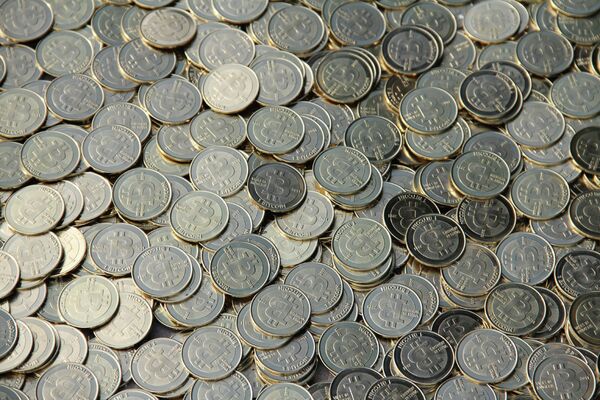WASHINGTON, May 6 (RIA Novosti) – Looking for an ocean-front apartment in the Bahamas? You can pick one up online for about 4,583 Bitcoins (BTC). Or you could order an ounce (28 grams) of golden Russian osetra caviar or a half-pound (one-quarter kilo) of Italian white truffles for 1.1 Bitcoins.
What’s a Bitcoin? It’s the unregulated, virtual currency growing in popularity around the world, which allows online payments to be sent from one party to another without going through a financial institution, like a bank or credit card company.
Most people acquire Bitcoins by conducting a business transaction or by purchasing a coin and its constantly fluctuating value on an exchange, like Mt. Gox.
Or you can “mine” them by minting your own Bitcoins on powerful computers using complex algorithms. But you can’t hold a Bitcoin, because there is nothing to hold; all transactions are processed electronically.
The currency was first proposed in a paper written in 2009 by a mysterious computer programmer named Satoshi Nakamoto -- thought to be a pseudonym -- as a way to bypass financial institutions when doing business online.
Bitcoin payments are made using virtual Bitcoin wallets, which are alpha-numeric strings that give no details of the buyer’s or seller’s identity. And unlike traditional currencies, which are backed by a central bank or commodity, Bitcoin has no central authority and is not tied to any government, but is “regulated” by users of the currency system.
“I believe in the free market and this is the best tool to use in a free market,” Blake Bowdish, owner of Five Diamond Delicacies in Miami, which accepts Bitcoins for gourmet food – including Russian caviar and Italian truffles –told RIA Novosti.
Bowdish began using Bitcoin “very recently” and was pleasantly surprised when several of his customers paid using the “cryptocurrency.”
“Within the first week of starting to use Bitcoin, I had 12 transactions come my way,” he said.
Bitcoin transactions occur instantaneously, fees are very low – around half of one percent, Bowdish said – and the complicated system of peer-to-peer crosschecks and verification makes the system very secure.
The anonymity allowed by the virtual wallets has, however, led to some criticism being leveled against Bitcoin, which some say is the perfect vehicle for money-laundering and dodgy deals.
“When you transfer Bitcoins to someone else, it’s as if you handed over a paper bag filled with $100 bills in a dark alley,” Nobel Prize-winning economist Paul Krugman said in an opinion piece in the New York Times last month.
“And sure enough, as best as anyone can tell, the main use of Bitcoin so far, other than as a target for speculation, has been for online versions of those dark-alley exchanges, with Bitcoins traded for narcotics and other illegal items,” Krugman wrote.
Tony Gallippi, co-founder and CEO of BitPay, a Paypal-type payment system for Bitcoin transactions, predicted that the currency will follow the same growth path as the Internet, which in its early days was targeted by “an article every other day that said ‘the Internet is bad, the Internet is dangerous, the Internet is full of scams.’”
“Read today’s news: ‘Bitcoin is bad, Bitcoin is dangerous, Bitcoin is full of scams…’ It’s the same articles from 20 years ago. They were wrong then and they are wrong now,” Gallippi wrote on PYMNTS.com.
Bitcoin has some high-profile backers, including multi-millionaires Cameron and Tyler Winklevoss, the twins who say Mark Zuckerberg stole the idea of Facebook from them, and actor Ashton Kutcher.
The Winklevoss brothers told the New York Times last month, when Bitcoin went on a rollercoaster ride on currency exchanges that took it from around $25 per virtual coin to $266, that they had around $11 million in Bitcoins.
Kutcher said last week at the TechCrunch Disrupt conference in New York that his venture capital company, A-Grade, has bought into Bitcoin.
Romanian graphic artist Luigi Ihnatiuc, 19, began doing business in Bitcoins in late March, when the frenzy surrounding the currency was reaching a peak.
“I really wanted to be part of the new currency, but since I was pretty broke, I said to myself: ‘Hey, I'm good with graphics. Why not get Bitcoins doing that?’” Ihnatiuc told RIA Novosti.
“In less than a month I got over 15 BTC, which, depending on which day you would've asked, would have meant $750 or $3,900,” he said.
Since then, Ihnatiuc has kept his digital coins in his “wallet” – the Bitcoin equivalent of a bank account – and exchanged a few for dollars to pay for school and weekends in the country.
He asks shopkeepers if they accept Bitcoin, and will frequent the few retail outlets that say they do.
Even though Bitcoins are not widely accepted at retail outlets or for services, the currency racked up transactions worth $24,713,232 worldwide in April.
On Monday one Bitcoin was worth about $120 or 3,721 roubles.
Oh, and the 4,583 BTC for that luxury apartment in the Bahamas works out to about $550,000, and the 1.1 BTC for the Russian caviar or Italian truffles is equal to around $135.
Both sound more affordable in Bitcoin.


